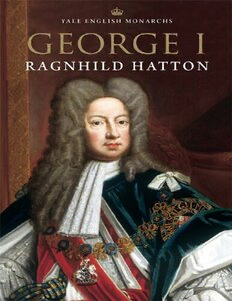
George I: Elector and King PDF
Preview George I: Elector and King
Also in the Yale English Monarchs Series ATHELSTAN by Sarah Foot EDWARD THE CONFESSOR by Frank Barlow WILLIAM THE CONQUEROR by David Douglas* WILLIAM RUFUS by Frank Barlow HENRY I by Warren Hollister KING STEPHEN by Edmund King HENRY II by W. L. Warren* RICHARD I by John Gillingham KING JOHN by W. L. Warren* EDWARD I by Michael Prestwich EDWARD II by Seymour Phillips RICHARD II by Nigel Saul HENRY V by Christopher Allmand HENRY VI by Bertram Wolffe EDWARD IV by Charles Ross RICHARD III by Charles Ross HENRY VII by S. B. Chrimes HENRY VIII by J. J. Scarisbrick EDWARD VI by Jennifer Loach MARY I by John Edwards JAMES II by John Miller QUEEN ANNE by Edward Gregg GEORGE I by Ragnhild Hatton GEORGE II by Andrew C. Thompson GEORGE III by Jeremy Black GEORGE IV by E. A Smith * Available in the U. S. from University of California Press For Harry, who had a Hanoverian great-grandmother First published in 1978 by Thames and Hudson Ltd This edition first published by Yale University Press in 2001 Copyright © 1978 Thames and Hudson New Edition © 2001 Peter S. Hatton and Paul G. Hatton New Foreword © 2001 Jeremy Black Library of Congress Control Number: 2001087415 ISBN 0–300–08883–3 (pbk.) A catalogue record for this book is available from the British Library Published with assistance from the Annie Burr Lewis Fund Contents FOREWORD TO THE YALE EDITION (by Jeremy Black) PREFACE SPELLING OF NAMES AND PLACES NOTE ON DATES I Parents and childhood II The electoral cap The father's plans for his son The family's advancement and George's marriage The primogeniture struggle George's divorce III Experience gained The Königsmarck myth George at the helm The prospect of England Struggle over the English succession between George and his mother Wider German horizons Losses of friends and companions IV The royal crown Hanover and Celle united George's household after 1698 The War of the Spanish Succession Death of queen Anne: the ‘Act of Settlement’ put into effect V Settling down Great Britain at the time of George's accession George and the party system The king's English The royal household VI Two issues of principle The struggle for place and profit Promotion by title The Hanoverian succession VII Three crises George I's image The Jacobite ‘Fifteen’ European issues 1716–17 The ministerial crisis Quarrel in the royal family VIII The watershed 1718–21 Lessons learnt European peace plans Success in the south Partial success in the north Shifts of emphasis IX Peace, its problems and achievements The South Sea bubble George, a captive of his ministers? George as a patron of the arts Unfinished business Alliances and counter-alliances War or peace? X Death of George I George's last journey The balance sheet BIBLIOGRAPHY NOTES TO THE TEXT GENEALOGICAL TABLES MAP 1: George's Hanoverian dominions and the near neighbours of his electorate MAP 2: Northern Europe MAP 3: Southern Europe INDEX FOREWORD TO THE YALE EDITION by Jeremy Black George I: Elector and King appeared shortly before the end of Ragnhild Hatton's distinguished career at the London School of Economics. It was published in 1978 by Thames and Hudson (in the United Kingdom), Harvard University Press (in the United States), and, appropriately, in German as George I: Ein deutscher Kurfürst auf Englands Thron, by Societäts-Verlag, Frankfurt. The biography amply justified that often clichéd term, ‘the culmination of a lifetime's study’, because Hatton's first book, her thesis published in 1950, had covered a central topic in British foreign policy during George's initial seven years as king. Hatton's biography also consolidated her expertise as a biographer. She had published a major life of Charles XII of Sweden (1968) as well as a number of studies of Louis XIV that, while not amounting to a complete biography, nevertheless showed her acute understanding of the monarch both as an individual and in the context of his times.1 Writing a biography of George I was a formidable challenge. Founder of the Hanoverian dynasty in Britain, he was very much both elector of Hanover and king. As a consequence he had partly eluded other British historians who lacked Hatton's interest in, deep knowledge of, and appreciation of Continental power politics and Hanoverian concerns. J.H. Plumb's The First Four Georges, for example, first published in 1956 and reissued, uncorrected, as late as 2000, included many of the standard, but erroneous judgements of an earlier age. Whereas Plumb was definite that Sophia Charlotte, countess of Darlington was George's mistress, Hatton had demonstrated that she was his half-sister, that she was devoted to her own husband, and that incest was never imputed to George by anyone close to the royal circle. Hatton's George was a ruler and a person in his contemporary European context, and her study was based on extensive and wide-ranging archival research. She was interested in people (alive as well as dead) and successfully sought to discover George as an individual, to probe his relations with his parents and (unfaithful) spouse, with his mistress, his children, and his courtiers and ministers. In place of a militaristic dolt, George was presented as a more complex individual, with cultural and intellectual interests, and he was located in terms of the Early Enlightenment. All of these features justifiably earned Hatton high praise, and they emerge clearly from a reading of her book.2 This introduction seeks to offer an updating that focuses on perspectives suggested by subsequent work, and also tries to explain why George was less popular with his British subjects than the above account might imply. Subsequent research has not challenged Hatton's valuable account of George as elector, nor her clear and well-grounded discussion of the international relations of his reign that provided much of the dynamic for his policies. Hatton was very good on the House of Brunswick and its position in Europe. Indeed the measure of her achievement stands even clearer as a result of
